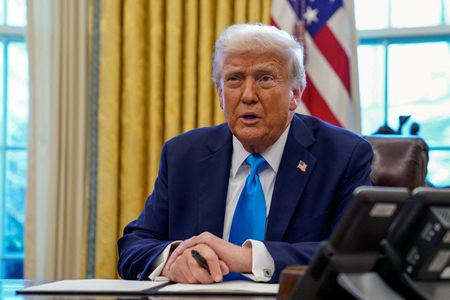By David Lawder, Andrea Shalal
WASHINGTON (Reuters) -Jamieson Greer, President Donald Trump’s nominee for U.S. trade representative, said on Thursday that a universal tariff needs further study to gauge its impact on the U.S. trade deficit, but added Trump’s current tariff actions against China, Canada and Mexico are about curbing fentanyl trafficking.
Greer told a U.S. Senate confirmation hearing that Trump’s campaign promise of imposing at least a 10% universal tariff would be examined under Trump’s inauguration day trade memo, which ordered a report by April 1.
He said the study would also examine the impact of a growing U.S. goods trade deficit, which on Wednesday reached a record $1.2 trillion for all of 2024 as imports surged.
“A universal tariff is something that should be studied and considered to see if it can reverse the direction of that deficit,” Greer told the Senate Finance Committee.
Asked about Trump’s initial tariff threats against Canada and Mexico and new 10% duties on Chinese imports, Greer said the goal of these actions was reaching agreements to curb the flow of the deadly opioid fentanyl into the U.S., and illegal migration.
“The action that the president is talking about is about fentanyl,” Greer said. “We don’t want another single fentanyl death. A kilogram of fentanyl can kill 50,000 people, by some calculations. We can’t have that, and we need to come to an agreement on that.”
Regarding the U.S. trading relationship with China, he said it needs to become balanced, and that this would require more than lowering Chinese tariffs, but also reducing non-tariff barriers.
TRADE WAR VETERAN
Greer, a trade lawyer and veteran of Trump’s first-term trade war against China, also said that resilient supply chains are critical for U.S. economic and national security, and that he would work to use trade policy to encourage investments to provide better-paying jobs for American workers.
Greer served as chief of staff to Trump’s former U.S. Trade Representative Robert Lighthizer, the architect of Trump’s first-term tariffs on some $370 billion worth of Chinese imports and renegotiation of the North American free trade deal with Canada and Mexico.
He said the 2020 U.S.-Mexico-Canada Agreement on trade needed to be re-examined to ensure China and other foreign countries of concern are not “free-riding” on it for duty-free access to the U.S.
Greer added that he wanted to hold Mexico and Canada to their USMCA market access agreements, including dairy for Canada and energy for Mexico.
Asked by several senators about his plans for expanding agricultural trade, which suffered during Trump’s past trade wars, Greer said he wanted to expand foreign markets for “competitive” U.S. farmers.
“That means that we need to go and gain market access where things have been closed,” he said, citing India and Turkey as markets that need to fully open to U.S. farm goods.
In his opening remarks, Greer said he would push for a pragmatic U.S. trade policy focused on rebuilding U.S. manufacturing and shoring up supply chains.
Greer’s testimony comes after two roller-coaster weeks of tariff actions and Trump moves against Colombia, Mexico, Canada and China.
Only the 10% additional tariff on Chinese goods has taken effect. Colombia avoided tariffs, while Trump has delayed any Mexico and Canadian tariff for 30 days.
The churn has left some lawmakers frustrated, given that Congress has the constitutional authority to set trade policy.
Greer said he would consult closely with Congress on an active and pragmatic trade policy that he said was critical to restoring lower inflation and unemployment and higher real median household income seen in Trump’s last administration.
“If the United States does not have a robust manufacturing base and innovation economy, it will have little in the way of hard power to deter conflict and protect Americans,” he said.
(Reporting by David Lawder and Andrea Shalal; additional reporting by Bo Erickson; Editing by Cynthia Osterman and Rod Nickel)











